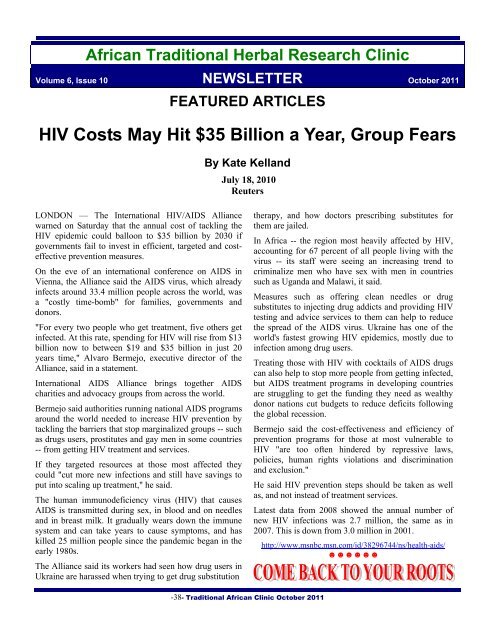African Traditional Herbal Research Clinic STD's ... - Blackherbals.com
African Traditional Herbal Research Clinic STD's ... - Blackherbals.com
African Traditional Herbal Research Clinic STD's ... - Blackherbals.com
Create successful ePaper yourself
Turn your PDF publications into a flip-book with our unique Google optimized e-Paper software.
<strong>African</strong> <strong>Traditional</strong> <strong>Herbal</strong> <strong>Research</strong> <strong>Clinic</strong><br />
Volume 6, Issue 10 NEWSLETTER October 2011<br />
FEATURED ARTICLES<br />
HIV Costs May Hit $35 Billion a Year, Group Fears<br />
By Kate Kelland<br />
July 18, 2010<br />
Reuters<br />
LONDON — The International HIV/AIDS Alliance<br />
warned on Saturday that the annual cost of tackling the<br />
HIV epidemic could balloon to $35 billion by 2030 if<br />
governments fail to invest in efficient, targeted and costeffective<br />
prevention measures.<br />
On the eve of an international conference on AIDS in<br />
Vienna, the Alliance said the AIDS virus, which already<br />
infects around 33.4 million people across the world, was<br />
a "costly time-bomb" for families, governments and<br />
donors.<br />
"For every two people who get treatment, five others get<br />
infected. At this rate, spending for HIV will rise from $13<br />
billion now to between $19 and $35 billion in just 20<br />
years time," Alvaro Bermejo, executive director of the<br />
Alliance, said in a statement.<br />
International AIDS Alliance brings together AIDS<br />
charities and advocacy groups from across the world.<br />
Bermejo said authorities running national AIDS programs<br />
around the world needed to increase HIV prevention by<br />
tackling the barriers that stop marginalized groups -- such<br />
as drugs users, prostitutes and gay men in some countries<br />
-- from getting HIV treatment and services.<br />
If they targeted resources at those most affected they<br />
could "cut more new infections and still have savings to<br />
put into scaling up treatment," he said.<br />
The human immunodeficiency virus (HIV) that causes<br />
AIDS is transmitted during sex, in blood and on needles<br />
and in breast milk. It gradually wears down the immune<br />
system and can take years to cause symptoms, and has<br />
killed 25 million people since the pandemic began in the<br />
early 1980s.<br />
The Alliance said its workers had seen how drug users in<br />
Ukraine are harassed when trying to get drug substitution<br />
therapy, and how doctors prescribing substitutes for<br />
them are jailed.<br />
In Africa -- the region most heavily affected by HIV,<br />
accounting for 67 percent of all people living with the<br />
virus -- its staff were seeing an increasing trend to<br />
criminalize men who have sex with men in countries<br />
such as Uganda and Malawi, it said.<br />
Measures such as offering clean needles or drug<br />
substitutes to injecting drug addicts and providing HIV<br />
testing and advice services to them can help to reduce<br />
the spread of the AIDS virus. Ukraine has one of the<br />
world's fastest growing HIV epidemics, mostly due to<br />
infection among drug users.<br />
Treating those with HIV with cocktails of AIDS drugs<br />
can also help to stop more people from getting infected,<br />
but AIDS treatment programs in developing countries<br />
are struggling to get the funding they need as wealthy<br />
donor nations cut budgets to reduce deficits following<br />
the global recession.<br />
Bermejo said the cost-effectiveness and efficiency of<br />
prevention programs for those at most vulnerable to<br />
HIV "are too often hindered by repressive laws,<br />
policies, human rights violations and discrimination<br />
and exclusion."<br />
He said HIV prevention steps should be taken as well<br />
as, and not instead of treatment services.<br />
Latest data from 2008 showed the annual number of<br />
new HIV infections was 2.7 million, the same as in<br />
2007. This is down from 3.0 million in 2001.<br />
http://www.msnbc.msn.<strong>com</strong>/id/38296744/ns/health-aids/<br />
☻☻☻☻☻☻<br />
-38- <strong>Traditional</strong> <strong>African</strong> <strong>Clinic</strong> October 2011
















